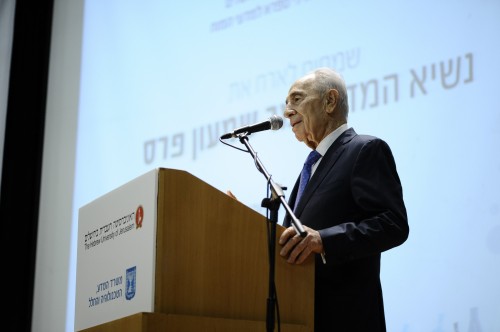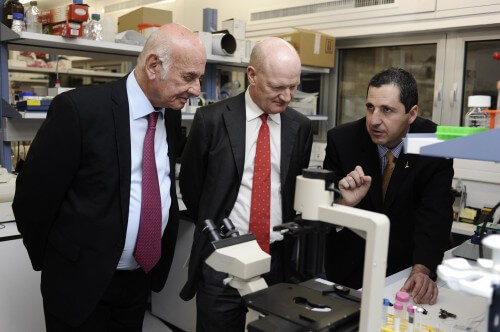Peres spoke to the scientists of the future at the Israel Science Day closing event at the Hebrew University * Minister of Education Shay Piron was a guest at the Technion

President Shimon Peres closed the Israel Science Day events this evening (Tuesday) with a speech to hundreds of students, brain researchers and academics at an event marked by brain research held at the Hebrew University, in which he outlined the path for Israel's future scientists. The president emphasized that brain research is the main field that is going to be on the world agenda and said: "In Israel there are extremely talented scientists and researchers. Israel is already a world power in brain research and you have the challenge to continue to excel."
The President emphasized the importance of investing in science in Israel and said: "We can take an example from the tremendous success that the State of Israel had with nanotechnology - every shekel that the State of Israel invested in the research and development of nanotechnology returned many times over. Now it is the turn of the Israeli brain revolution. The European Union and the United States also understand this and invest billions in brain research. The State of Israel may be small in resources but large in talent - we excel in brain research and the relationship between the brain and the computer. Human wisdom combined with punctuality and the speed of the brain can save lives and heal patients, I believe that if we invest in brain research within ten years we will live in a completely different world."
The Minister of Education at the Science Day at the Technion: "The classical subjects are the basis for all development, initiative and innovation - they must be returned to the center of the schools"
The Minister of Education, Rabbi Shay Piron, was hosted today (26.3.14) at the Technion at a special event on the occasion of Israel Science Day. The event was held at the initiative of the Ministry of Science, Technology and Space and its purpose is to bring the general public closer to science, to raise awareness of the achievements of science and scientists in Israel and to encourage science education.
"It is important to raise awareness of science and create a commitment to the values it represents," said Minister Piron. "The State of Israel will not be able to deal strategically with the surrounding reality and with the huge shortcomings it has in natural resources, if it does not strengthen the field of science in a distinct way and turn our advantage in the international arena into an advantage driven by the power of human excellence."
The Minister of Education added, "We must return the classical sciences to the schools. They are the basis for all initiative and innovation development and are the greatest basis for meaningful learning and empowerment of the student."
The president of the Technion, Professor Peretz Lavi, said that "Precisely in the days of academic boycotts of Israeli institutions, the Technion is expanding its academic collaborations with universities around the world. The applied engineering research center we established in New York with Cornell University is growing and the first students are already studying there. The Technion recently received an unprecedented donation, and we are establishing a branch of the Technion that will pave the way to China. This week an Israeli-British conference on medicine was held at the Technion, last week a conference was held in collaboration with Canada. Today at the Technion there are more new faces and more languages are heard there."
"This is a holiday for me," said Haifa Mayor Yona Yahav, "Science must be made accessible so that every person can take part in it. Haifa is the city with the largest number of Nobel Prize winners in Israel. We are investing a lot of resources in bringing technological studies back to Haifa and I am happy that the Technion is taking part in these efforts."
During the event, Technion researchers presented their research:
Professor Dani Ben Shahar, from the Faculty of Architecture and Urban Planning spoke about irrationality in decision-making and examined whether it is possible to streamline the privatization of public housing in Israel. According to him, it is possible to significantly increase the state's income from the sale of apartments to tenants in public housing and shorten the time for their sale.
Dr. Merav Aharon, from the Faculty of Architecture and Urban Planning, claimed in her lecture that the high cost of housing serves as a central mechanism for distinguishing and separating from the lower classes. In a diverse and multi-stressed society, friendly groups strive for social leadership, to distinguish themselves from the crowd and to raise their children among those they perceive to be similar to them. Under these conditions, acting within the rules of the game of the "market" is doomed to failure.
Professor Eilat Tal, from the Faculty of Electrical Engineering presented a new technology that will lead archeology into the 21st century. According to her, the computer graphics offers a surprising solution to the archaeologists' challenges, and allows not only display, but also documentation, analysis, and reconstruction of findings. With the help of new developments, it is now possible to view XNUMXD models of complete tools even though only small parts of them have been discovered, to restore worn engravings and prints, to reveal interesting characteristics, and to find connections to other findings.
Professor Avishai Mandelbaum, from the Faculty of Industrial Engineering and Management gave a lecture on service systems, such as: hospitals, telephone service centers, online services and more, focusing on operational service indicators, such as the length of waiting in an emergency room or the employment level of a call operator, and paying attention to the relationship with indicators clinical or economic.
Professor Uri Lazmes, from the Faculty of Biotechnology and Food Engineering, claimed in his lecture that processed food is part of the reality of our lives in the 21st century. And that we don't see a real alternative solution that will make it possible to satisfy the needs of the human race without processed food. In his lecture, Professor Lazmes presented an imaging system for human digestion that he developed in his laboratory and claimed that in the future the production and processing of food will be adapted to each person, and the day is not far when we will be able to receive personalized nutrition.
The event at the Technion was concluded by the winner of the 2011 Nobel Prize in Chemistry, Professor Dan Shechtman, with a lecture on "Science, art and the quality of life. "Science gives us modern life and extends our life span," said Professor Shechtman. "Art adds quality to our lives." He presented the work of Leonardo da Vinci who improved the art he created through science and his research in the various fields.

The science ministers of Israel and Great Britain agreed today on increasing the scientific cooperation budget
The Minister of Science, Jacob Perry, today welcomed the British Minister of Science, David Willets, who is visiting Israel ahead of the Israeli Science Day, which will be held this Wednesday. As part of his visit, the two agreed on an addition of approximately NIS 5.6 million to the scientific cooperation budget between Israel and Great Britain.
During the visit of the British Minister of Science, David Willets, it was agreed to increase the BIRAX (British-Israeli Research and Academic Research) budget by 1,000,000 pounds for a period of 3 years (500,000 pounds each side).
Minister Perry welcomed the decision to increase the budget and said that "the academic environment in Europe has become a political environment - increasing the cooperation budget is the most appropriate response of the British government to the calls to boycott Israel"
On the British side, the Ministry of Universities and Research and the British Council participate in the budget increase, and on the Israeli side - the Ministry of Science, Technology and Space. The significant increase in the budget will enable the financing of a larger number of studies and the expansion of research areas.
(BIRAX (British-Israeli Research and Academic Research
BIRAX was established as a program for scientific cooperation, which includes possibilities for joint research and meetings between Israeli and British scientists in order to promote scientific relations between the two countries.
Since 2011, as part of the BIRAX program, eight partners have been approved with a total budget of over NIS 17,000,000, as well as short-term scholarships for young scientists.
